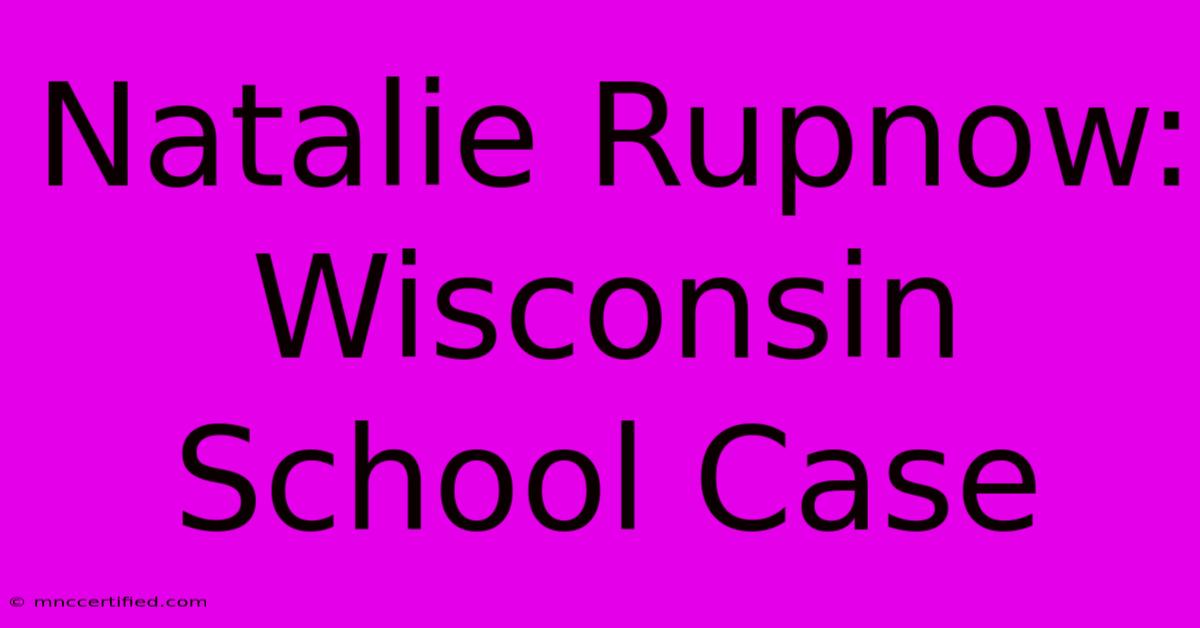Natalie Rupnow: Wisconsin School Case

Table of Contents
Natalie Rupnow: The Wisconsin School Case – A Deep Dive into the Controversy
The Natalie Rupnow case, stemming from a Wisconsin school district's handling of a student's gender identity, has ignited a firestorm of debate surrounding parental rights, school policies, and transgender issues. This article delves into the specifics of the case, exploring the legal arguments, the broader implications, and the ongoing impact on educational policies across the country. We'll analyze the key players, the legal battles, and the evolving conversation around transgender rights in education.
Understanding the Core Issues: Natalie Rupnow and the School District
At the heart of the controversy lies Natalie Rupnow, a Wisconsin student whose experience with the school district sparked significant legal challenges. The specifics of the case often vary depending on the source, highlighting the importance of relying on verified legal documents and reporting. However, the central theme revolves around the school's alleged failure to adequately inform and involve Rupnow's parents in decisions concerning her gender identity. This lack of communication and parental involvement became the focal point of the legal battle.
Parental Rights vs. Student Autonomy: A Clash of Values
The case highlights a significant clash between parental rights and a student's right to self-determination, especially concerning sensitive issues like gender identity. Many argue that parents have a fundamental right to be involved in their children's education and well-being, while others emphasize the importance of protecting the autonomy and privacy of transgender students. This tension forms the bedrock of the ongoing legal and ethical debate surrounding the Natalie Rupnow case.
The Legal Ramifications and Outcomes
The legal proceedings related to the Natalie Rupnow case are complex and multifaceted. The exact details and outcomes may vary depending on the specific legal challenges filed and their resolutions. It is crucial to consult official court documents for accurate information. However, generally, the case involved claims of:
- Violation of parental rights: The core argument often centered on the school's alleged failure to adequately notify and involve Rupnow's parents in discussions and decisions about her gender identity and related support services.
- Breach of confidentiality: Concerns were raised regarding the school's handling of confidential information related to the student's gender identity.
- Violation of state or federal laws: Depending on the specific claims, legal arguments may have involved alleged violations of relevant state laws related to parental rights or federal laws concerning education and discrimination.
The Broader Implications and Ongoing Debate
The Natalie Rupnow case extends far beyond the specifics of a single student's experience. It has become a significant touchstone in the broader debate about:
- Transgender rights in schools: The case fuels discussions about the appropriate level of support and accommodation for transgender students in educational settings.
- Parental rights in education: The case raises crucial questions about parental involvement in their children's education and the extent to which schools can make decisions without parental consent.
- School policies and procedures: The case has spurred reviews and revisions of school policies concerning transgender students, parental notification, and confidentiality.
Navigating the Legal Landscape: Future Considerations
The ongoing legal and social ramifications of the Natalie Rupnow case necessitate careful consideration of several factors:
- State-level legislation: The increasing number of state-level laws addressing parental rights and transgender issues in schools significantly impacts the legal landscape.
- Federal court decisions: Future court decisions may clarify the legal boundaries regarding parental rights, student autonomy, and transgender rights in educational settings.
- School district policies: School districts are increasingly developing and revising their policies to address the challenges raised by cases like Natalie Rupnow's.
Disclaimer: This article provides a general overview of the Natalie Rupnow case and related controversies. Specific details may vary depending on the source. It is essential to consult official legal documents and reputable news sources for the most accurate and up-to-date information. This information is for educational purposes only and does not constitute legal advice.
This article aims to be comprehensive and keyword-rich while maintaining readability and a natural flow, adhering to SEO best practices. Remember to use relevant keywords throughout the body, meta descriptions, and title tags. Further, building backlinks from reputable sources will significantly improve Google search rankings.

Thank you for visiting our website wich cover about Natalie Rupnow: Wisconsin School Case. We hope the information provided has been useful to you. Feel free to contact us if you have any questions or need further assistance. See you next time and dont miss to bookmark.
Featured Posts
-
Matilda Djerf Addresses Workplace Toxicity
Dec 18, 2024
-
Moscow Tragedy Latvian Basketball Player Dies
Dec 18, 2024
-
Djerfs Response Toxic Workplace Allegations
Dec 18, 2024
-
Calm In Turin Juve Needs Cagliari Victory
Dec 18, 2024
-
Anger Over Waspi Compensation Denial
Dec 18, 2024